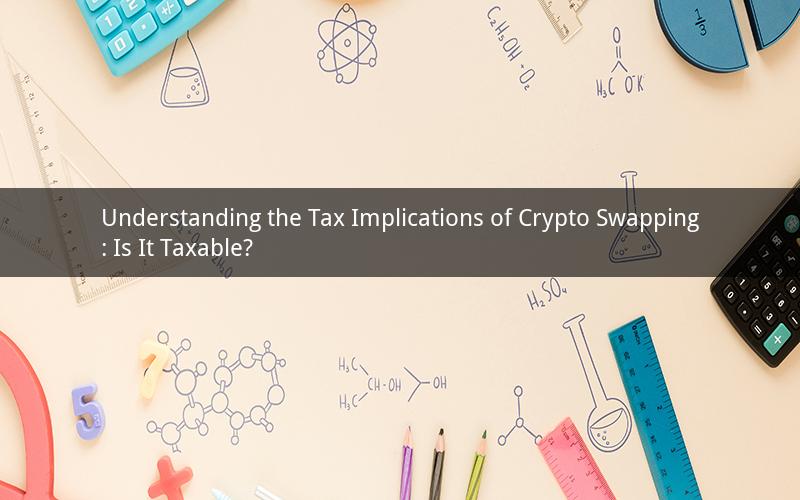
Introduction:
In the rapidly evolving world of cryptocurrencies, one common activity among investors is crypto swapping. This process involves exchanging one cryptocurrency for another. However, many individuals are left pondering whether crypto swapping is subject to taxation. In this article, we will delve into the intricacies of crypto swapping and shed light on its tax implications.
1. What is Crypto Swapping?
Crypto swapping is the process of exchanging one cryptocurrency for another. It is a common practice among investors to diversify their portfolios or take advantage of price fluctuations in the crypto market. Unlike traditional currency exchanges, crypto swapping does not involve converting cryptocurrencies into fiat currency.
2. Tax Implications of Crypto Swapping
The tax treatment of crypto swapping varies depending on the jurisdiction and the specific circumstances. However, here are some general guidelines to consider:
a. Capital Gains Tax:
In many countries, crypto swapping is considered a taxable event. When you swap one cryptocurrency for another, you may be liable for capital gains tax. This tax is calculated based on the difference between the cost basis (the amount you paid for the original cryptocurrency) and the fair market value of the swapped cryptocurrency at the time of the swap.
b. Reporting Requirements:
Even if crypto swapping is taxable, it is crucial to report it accurately. Failure to do so can result in penalties and interest. Most tax authorities require you to keep detailed records of your cryptocurrency transactions, including the date, amount, and type of cryptocurrency involved.
c. Taxable Events:
In addition to crypto swapping, there are other taxable events related to cryptocurrencies, such as selling, gifting, or using them to purchase goods or services. It is essential to understand these events and their tax implications to ensure compliance with applicable tax laws.
3. Tax Considerations for Different Jurisdictions
The tax treatment of crypto swapping varies from country to country. Here are some notable examples:
a. United States:
In the United States, crypto swapping is generally subject to capital gains tax. The IRS considers cryptocurrencies as property, and any gain or loss from their sale or exchange is subject to taxation. It is essential for U.S. taxpayers to report their crypto swapping activities on Schedule D of their tax returns.
b. United Kingdom:
In the United Kingdom, crypto swapping is subject to capital gains tax, but there is an annual exempt amount of £12,300. If your total gains exceed this amount, you will be required to pay tax on the excess. Additionally, UK taxpayers must report their crypto swapping activities on their self-assessment tax returns.
c. Canada:
In Canada, crypto swapping is subject to capital gains tax. Taxpayers must report their crypto swapping activities on their tax returns and pay tax on the capital gains. However, Canadian residents can benefit from the lifetime capital gains exemption, which can help reduce their tax liability.
4. Tax Planning Strategies for Crypto Swapping
To minimize the tax burden associated with crypto swapping, consider the following strategies:
a. Tax-Loss Harvesting:
Tax-loss harvesting involves selling a cryptocurrency at a loss to offset capital gains from other crypto swapping activities. This strategy can help reduce your overall tax liability.
b. Holding for the Long Term:
Long-term capital gains tax rates are often lower than short-term rates. By holding cryptocurrencies for more than a year before swapping them, you may benefit from lower tax rates.
c. Diversification:
Diversifying your cryptocurrency portfolio can help reduce the risk of significant losses and potentially minimize your tax burden. Spreading your investments across various cryptocurrencies can also help you avoid concentrating your gains in a single asset.
5. Conclusion
Crypto swapping is a common practice among cryptocurrency investors, but it is crucial to understand its tax implications. While the tax treatment of crypto swapping varies by jurisdiction, it is generally subject to capital gains tax. By staying informed and employing tax planning strategies, investors can minimize their tax burden and ensure compliance with applicable tax laws.
Questions and Answers:
1. Q: Is crypto swapping taxable in all countries?
A: No, the tax treatment of crypto swapping varies by jurisdiction. While many countries subject crypto swapping to capital gains tax, some may have different regulations.
2. Q: How do I calculate the capital gains tax on crypto swapping?
A: To calculate the capital gains tax on crypto swapping, subtract the cost basis (the amount you paid for the original cryptocurrency) from the fair market value of the swapped cryptocurrency at the time of the swap.
3. Q: Can I deduct losses from crypto swapping on my tax return?
A: Yes, you can deduct losses from crypto swapping on your tax return. However, the IRS has specific rules regarding the deductibility of cryptocurrency losses.
4. Q: What is the annual exempt amount for crypto swapping in the United Kingdom?
A: In the United Kingdom, the annual exempt amount for crypto swapping is £12,300. If your total gains exceed this amount, you will be required to pay tax on the excess.
5. Q: Can crypto swapping be tax-free if held for a long period?
A: Yes, holding cryptocurrencies for more than a year before swapping them can potentially result in lower tax rates. Long-term capital gains tax rates are often lower than short-term rates.